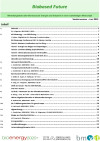Suchergebnisse für "Factsheet: Energietechnologien gestalten, die für alle sinnvoll und nutzbar sind"
Mitteilungsblatt "Biobased Future" - Sondernummer/Juni 2012

HR DI M. Wörgetter, DI D. Bacovsky, DI (FH) A. Sonnleitner
Herausgeber: Bioenergy2020+ GmbH, Mitherausgeber für den Sonderteil IEA Bioenergy: JOANNEUM RESEARCH Forschungsgesellschaft - DI Kurt Könighofer
Deutsch, 32 Seiten
Downloads zur Publikation
Renovation with passive house technology by master-builder – verified planning documentation – Guide and seminars
The project aims at an increased implementation of passive house technology by the planning as well as the operating master-builder.
e-genius.at: The Open Content knowledge and learning platform
The objective of the project was to develop online teaching materials on the topics energy-efficient buildings and renewable energy sources in collaboration with technical vocational schools and vocational higher secondary schools.
Booklet issued by Building of Tomorrow with about 20 practical passive house thermal bridges free connection details for large-volume residential buildings
In particular, for buildings with very low energy consumption on heating the influence of heat bridges have a special value. Since in passive house construction a largely heat bridge free execution is required, the most frequent and significant heat bridges are collected in a booklet.
Management of the loads of public water treatment plants - ARAFIT
ARAFIT develops a concept for the regional management of the loads of public water treatment plants in a partnership of planners, operators and major water consumers following the idea of sustainable least cost planning resulting in efficient, flexible and future oriented regional infrastructure.
Quality criteria for the Building of Tomorrow
Development and implementation of contributions to the quality control of innovative technologies in the areas of building services and insulation that are derived substantially from HAUSderZukunft findings.
ECR Energy City Graz - subproject 3: +ERS - Plus Energy Network Reininghaus Süd
The multifunctional neighbourhood "+ERS - Plus Energy Network Reininghaus Süd" was realized within the urban planning area of Graz-Reininghaus. The project aims to optimize the energy concept of the single buildings as well as of the building cluster in order to achieve a plus-energy standard within the residential neighbourhood.
IEA-PVPS Task 13: Performance, Operation and Reliability of Photovoltaic Systems (Working period 2018 - 2021)
The IEA Task 13 develops independent, internationally valid analyses and recommendations for the operation and reliability of PV systems and their components. The continuation of the Austrian participation ensures the flow of information back to the Austrian photovoltaic industry through international cooperation and strengthens Austria as a location for innovation and production.
IEA PVPS Task 15: Acceleration of BIPV
Building integrated Photovoltaics (BIPV) is one of the future markets for Photovoltaics which enables the combination of architecture and energy technology. The project focussed on further national research in the area of BIPV, which is to be raised to an international level.
ERSCP 2021 - European Roundtable on Sustainable Consumption and Production
8. - 10. September 2021
Graz
ERSCP21 will consider the possibilities to reduce the emission of climate-relevant gases during production as well as to reduce upstream emissions by changing consumer behavior. The topics discussed at the conference cover a number of UN Sustainable Development Goals.
IEA AFC Annex 35: High‐Purity Hydrogen Production with the Reformer Steam Iron Cycle (2018)

Demonstration eines Laborprototyps zur dezentralen Herstellung von hochreinem Wasserstoff aus Biogas.
S. Nestl, G. Voitic, R. Zacharias, S. Bock, V. Hacker
Herausgeber: Wiley-VCH, Energy Technology
Englisch, 7 Seiten
GrünStattGrau – Innovations for Greening Cities "The green living laboratory"
GrünStadtGrau represents the holistic of competence for green building technologies such as green roofs and living walls in Austria. It generates impulses for urban green infrastructure on buildings and links innovative products and projects, supports through know-how and analysis for implementation processes. GrünStattGrau guides urban and participatory strategies from development to implementation.
Tageslichtnutzung In Gebäuden

Österreichischer Beitrag zum TASK 21 des IEA Programms "Solar Heating and Cooling"
Forschungsforum
3/2000
Herausgeber: BMVIT
Deutsch, 6 Seiten
Downloads zur Publikation
Positioning of sustainable gardening products in retail sales markets
Market analysis for sustainable gardening products and research of marketing strategies. Promotion of a range of sustainable products in the Austrian retail sales market specialized in gardening. Development of a concept for implementation together with one Austrian chain of garden centres (bellaflora).
ZSG - Sustainable Concepts in urban redevelopment and building refurbishment

Project on research and implementation for ecological and energy efficient concepts, urban redevelopment and building refurbishment. Performance of a routing project on a former ter-ritory of the Austrian armed forces in Steyr.
Transfer initiative - The future belongs to the passive house

Developing the passive house standard from pilot projects to a common standard in housing projects with an optimum of comfort. Comprehensive transfer initiative of the passive house standard by fairs, exhibitions and lobbying activities in communities.
Climate protection in Schools: a prototype for targeted oriented knowledge transfer for students on the basis of energy efficient buildings
The saying "Was Hänschen nicht lernt, lernt Hans nimmermehr." which can be translated with the English saying "You can´t teach an old dog new tricks." especially applies to the issue of "climate protection" in general. Therefore children must be made aware of the importance of the subject from the beginning on in order to live their life efficiently and environmentally friendly. Based on a research and on an evaluation of existing teaching materials teachers and students will develop, how students understand the topic "climate protection" with a focus on "building and living in the future" the easiest way.
Forum Econogy 2016
22. September 2016
Science Park 3 - Johannes Kepler Universität Linz, Altenberger Straße 69, 4040 Linz
Europaweit wird nach dem Pariser Abkommen an neuen Strategien zur Forcierungder Energiewende gearbeitet. Wie diese auf Landes- bzw. Bundesebene aussehen,wird im diesjährigen Forum Econogy das Thema sein.
ChristophorusHouse(CHH)

Multifunctional building in passive house standard - The building was designed as innovative high-quality passive house (wood construction) with the latest ecological building automation as a pilot project which is multipliable in a reduced respectively altered form in Europe as well as overseas.
Information point for renewable and ecological materials (II) online information plus service offer

Development and maintainance of the internet platform for building materials made of renewable resources at www.nawaro.com, which serves the central information-point for important stake holders - private house builders, architects, master-builders and experts in the field of building laws.
